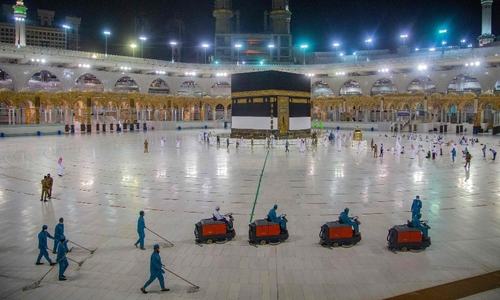Pilgrims, donning face masks and moving in small groups after days in isolation, began arriving in Makkah on Wednesday for the start of a historically unique and scaled-down Haj experience reshaped by the coronavirus pandemic.
The Haj, both physically and spiritually demanding, is intended to bring about greater humility and unity among Muslims.
Rather than standing and praying shoulder-to-shoulder in a sea of people from different walks of life, pilgrims this year are social distancing — standing apart and moving in small groups of 20 to limit exposure and the potential transmission of the coronavirus.
The pilgrimage is a journey that Muslims traditionally experience with relatives. In past years, it was common to see men pushing their elderly parents on wheelchairs in order to help them complete the Haj, and parents carrying children on their backs. The communal feeling of more than 2.5 million people from around the world praying together, eating together and repenting together has long been part of what makes Haj both a challenging and rewarding experience like none other.
This year, however, pilgrims are eating prepackaged meals alone in their hotel rooms and praying at a distance from one another. The Saudi government is covering all the pilgrims’ expenses of travel, accommodation, meals and healthcare.
While the experience is starkly different, it remains an opportunity for pilgrims to wipe clean past sins and deepen their faith.
Ammar Khaled, a 29-year-old Indian pilgrim who was born and raised in Saudi Arabia, said although he’s alone on Haj, he’s praying for those he loves.
“Words aren’t enough to explain how blessed I feel and how amazing the arrangements have been,” Khaled said. “They have taken every possible precaution.”
For the first time in Saudi history, the government barred Muslims from entering the kingdom from abroad to perform Haj in order to limit exposure of the coronavirus.
Instead, as few as 1,000 people already residing in Saudi Arabia were selected to take part in the Haj this year. Two-thirds are foreign residents from among the 160 different nationalities that would have normally been represented at the Haj. One-third are Saudi security personnel and medical staff.

The pilgrims, who were selected after applying through an online portal, were required to be between the ages of 20 and 50, with no terminal illnesses and showing no symptoms of the virus. Preference was given to those who have not performed the Haj before.
Pilgrims were tested for the coronavirus, given wristbands that connect to their phones and monitor their movement and were required to quarantine at home and in their hotel rooms in Makkah ahead of Wednesday’s start of the Haj. They will also be required to quarantine for a week after the Haj concludes on Sunday.
Makkah was sealed off for months ahead of the Haj, and the smaller year-round Umrah pilgrimage was suspended earlier this year, with pilgrims already in the city at that time flown back home.
International media were not permitted to cover the Haj from Makkah this year. Instead, Saudi government broadcast live footage from the Grand Mosque on Wednesday showing limited numbers of pilgrims, moving several feet apart, circling the Kaaba in the first rituals of Haj.
This year, pilgrims will only be able to drink water from the Zamzam well that is packaged in plastic bottles. Pebbles for casting away evil that are usually picked up by pilgrims along Haj routes will be sterilised and bagged ahead of time.
Pilgrims have also been given their own prayer rugs and special attire to wear during the Haj laced with silver nano technology that Saudi authorities say helps kill bacteria and makes clothes water-resistant. They were also provided with umbrellas to shield them from the sun, towels, soaps, sanitisers and other essentials, as well as online sessions in different language about what to expect on the Haj and the regulations in place.
“The kingdom of Saudi Arabia needs to put these measures in place so we can learn from this experience,” said Saudi infectious disease expert and World Health Organisation official, Dr Hanan Balkhy.
“The kingdom and the world will learn together what are the best ways to mitigate transmission during these types of events,” said Balkhy, assistant director-general for the antimicrobial resistance division at WHO’s headquarters in Geneva who has worked on past Haj missions.













































